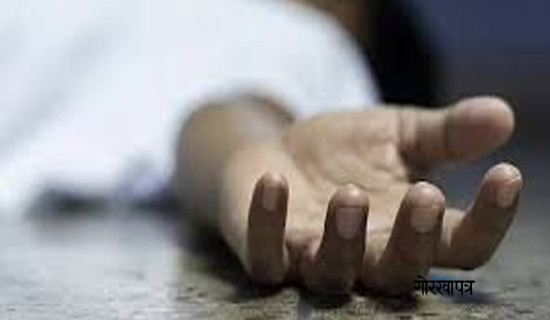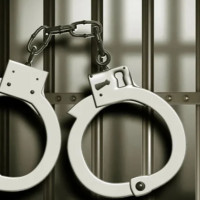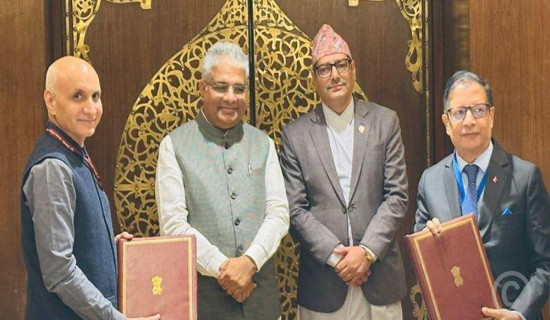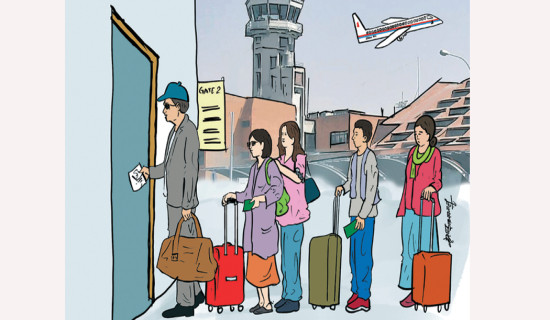- Thursday, 26 February 2026
Security forces prove their mettle in holding elections in single phase
Kathmandu, Nov. 27:Minus some minor glitches, it has been established that all four security agencies of the country have been capable enough and proved themselves competent in overall security arrangements and their proper execution after the local and general elections were concluded successfully in a single phase on May 13 and November 20, respectively.
Especially, Nepal Police Headquarters, the central security force of the federal government, which has been reeling under acute shortfall of required logistics of small arms and weapons, and proper communication sets and vehicles, deserves applause from all quarters.
The Police Headquarters had to take support of small arms of over 2,200 for the elections to the House of Representatives and Provincial Assemblies and other communication sets from Nepali Army after the government failed to arrange them in time and in absence of sufficient budget.
Dan Bahadur Karki, Senior Superintendent of Police (SSP) and Acting Police Spokesperson told The Rising Nepal that holding two separate elections in a single phase across all the districts had become possible only due to joint and better communication and coordination among the three other bodies - Armed Police Force (APF) Nepal, Nepali Army and National Investigation Department.
A Central Election Security Cell headed by AIG of Nepal Police, Lieutenant General of Nepali Army and AIG of APF and Director of NID and other officials from security division of the Ministry of Home Affairs had been formed to execute the introduced Integrated Election Security Planning-2079 by the Home Ministry.
SSP Karki said that all the four security agencies were able to successfully fulfill the responsibilities assigned by the government to ensure security environment for the local body elections and federal elections with the available resources. “Some of the incidents that happened before the election and on the day of the election were under the control and continuous surveillance of the police and other security agencies, which we did not consider a security challenge,” SSP Karki claimed.
“Whether the elections are held in one phase or in phases, we have to fulfill the responsibility given to us by the government in any situation and condition, which we did in both the elections, which we have not taken up as a major security challenge,” said Karki. The conclusion of three-tier elections successfully has provided us a lesson that the elections can be held peacefully and successfully and in a single phase if the country is in a state of non-violence and the role of political parties and people’s participation to make the election a success and secure is all important, added SSP Karki.
Nepali Army Spokesperson and Brigadier General Narayan Silwal said, “Every activity of the underground outfit was under our prior knowledge and information and we were also aware of the security challenges they could pose to us, which helped us to conduct the elections in a free and fearless environment.” Some bomb hoax created by such forces was done just to show their presence and drew the attention of public which were all under the pre-speculated knowledge of the security agencies, claimed Joint Secretary and Spokesperson for the Home Ministry Fanindra Mani Pokharel.
Joint Secretary Pokharel said that analysying the present soft security threats and challenges, the government too had reached the decision to hold the election in a single phase and within the available security infrastructures and logistics and had also become successful in this. “If we had held these elections phase-wise, it was sure to be costlier and would be further challenging from security perspective,” Pokharel said.
Binoj Basnyat, a retired Nepali Army Major General and political and security analyst, viewed that the success of elections that were held peacefully across the country except some minor incidents, is not only due to the government’s successful execution of its security planning but due to no such specific and visible underground outfit that had not created much panic and terror as they are already in a process of joining the mainstream of national politics through several rounds of talks and agreements reached with successive governments.
“The reference to this has been justified by CK Raut after he joined the mainstream politics by emerging as new and alternative political force in Terai after his party and he himself won this federal election and confirmed his step in the House of Representative for the first time,” said Basnyat. When there remains no visible security threat to conduct any type of election, the election will automatically be safe, sound and successful from security point of view, he added.
Economics of election
From the available data, the government had to manage a total of around Rs. 34 billion to conduct both the elections of local government and the federal and provincial assemblies. The Ministry of Finance had ensured a budget of Rs. 8.11 billion for conducting the election to the local government and Rs. 20. 48 billion for the elections to the House of Representatives and Provincial Assemblies.
Ananda Kafle, Joint Secretary and Spokesperson for the Ministry of Finance, said that of the total managed budget, now each concerned Ministry, including the Election Commission, will report to the Finance Ministry about their total expenditure. The final cost of the federal elections will come out soon after the vote counting process comes to an end, he said.
Of the total managed budget, Rs. 10.48 billion had been allocated to the Election Commission alone. This budget of Rs. 10.48 had been spent through the Ministry of Home Affairs/District Administration Offices, Local Police Office, Nepal Police, Armed Police Force and Nepali Army. The Home Ministry alone had received Rs. 9.13 billion to be spent under its agencies. Ministry of Defence had received Rs. 977 million for the Nepali Army and Rs. 57.3 million for the National Investigation Department.
Local election expenses
Similarly, the government had allocated a total budget of Rs. 8.11 billion for conducting the local level election held on May 13 this year. Of this, the EC alone had received Rs. 5 billion for its expenses. The figure, however, did not include the expenses made by the security agencies, including for the temporary police. Of the Rs. 8.11 billion, only Rs. 5.04 billion was spent to conduct the local election.







-square-thumb.jpg)








